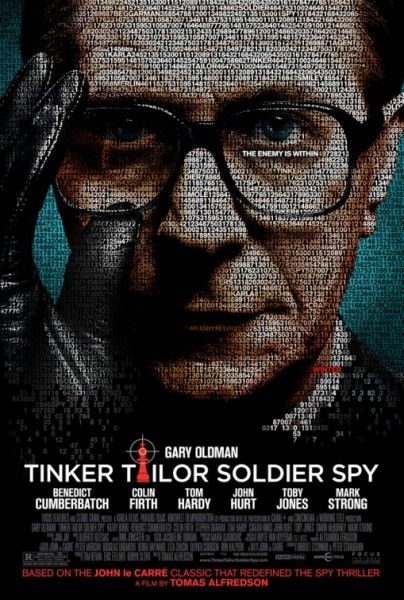Tinker Tailor Soldier Spy is a crackling, intense, complex, old-fashioned spy-thriller…but you need to wait over an hour to get there. Director Tomas Alfredson does a fantastic job of painting a rich 1970s setting that swings between London, France, Istanbul, and Budapest, but we have trouble getting our bearings as we jump across timelines and struggle to understand the wide cast of characters. Terrific performances begin to peek out and try to surface but are smothered in an overdone attempt to obfuscate rather than intrigue. Alfredson wants to put us inside the web of confusion of trying to uncover the truth, but he strings us along for too long. At some point, the spy game must begin.
George Smiley (Gary Oldman) is a former spy with Britain's Secret Intelligence Service (aka "The Circus") who is forced into retirement along with his friend and boss "Control" (John Hurt) after a botched mission in Budapest. In a roundabout fashion (which is really the fashion of the entire movie), Smiley is brought in to uncover a Soviet mole hidden in the upper echelon of the Circus. In order to protect the information, the suspects are given code names based on a nursery rhyme: Percy Alleline (Toby Jones) is "Tinker", Bill Haydon (Colin Firth) is "Tailor", Roy Bland (Ciarán Hinds) is "Soldier", Toby Esterhase (David Dencik) is "Poor Man", and Smiley—who was also in the upper echelon before he was canned—is "Spy". Smiley must outsmart the mole and must carefully choose his allies in order to do so.
That's the skeleton of the story, but Alfredson and screenwriters Bridget O'Connor and Peter Straughan try to keep us on our toes by jumping around the timeline, forcing us to keep the ensemble straight, and then making us try to remember what every piece of jargon means. I went through the entire film thinking that "Karla" was the code name for the Soviets (like how Americans are called "Yanks"), but I was handed a pamphlet afterwards (never a good sign when it comes to clarity) that spelled out all of the jargon, and it turns out "Karla" only refers to the Soviet Intelligence Chief, not all Soviets.
The film never cheats as much as it tries to exhaust with the information it provides. In the first act of the movie, we see Control give operative Jim Prideaux (Mark Strong) a mission, we see the mission go badly, we jump forward and see Control get canned for the mission even though Control previously told Prideaux that the mission was off the books. Then we see Control die, so we know Smiley is on his own, but whenever we flashback to see an alive-Control, we don't know if he's assigned Prideaux the mission yet or if it's in between the botched mission and his death.
And at the center you have Smiley, our protagonist who refuses to give us any hint of emotion for half the movie. Oldman is playing perfectly to the movie's tone, which for the first-half of Tinker Tailor is inscrutable. Smiley is kept an enigma until he finally gives a long monologue to Peter Guillam (Benedict Cumberbatch) about meeting "Karla" face-to-face (again, it sounded like "Karla" is the catch-all name for "The Enemy", so maybe the pamphlet is wrong). The cracks fade away and Oldman's full acting ability is allowed to envelope the audience and we finally begin to understand his character.
Once Smiley opens up to Guillam (and therefore to the audience), the movie splits wide open and everything beings clicking beautifully into place. However, it's not a matter of clever reveals or even illumination. It's a matter of pacing and having the characters do things rather than make allusions to "Project Witchcraft" or take a strong detour while operative Ricki Tarr (Tom Hardy) explains everything that happened to him in Istanbul and why he now fears for his life.
The irony is that this is all a result of Alfredson doing his job too well. He has the gift of economically telling his story and setting up the world with thoughtful cinematography, editing, set design, and music, so elements of the script become superfluous. There comes a point where a director can't make a world any richer than it already is and the audience becomes anxious to actually move through it rather than sit around and admire what's been done with the place. The opening scenes of Tinker Tailor Soldier Spy grab your attention, but then we're left with so much unnecessary world-building that the urgency is lost and we almost begin to think, "If they never found the mole, would it really be so bad?"
It's a shame that the movie should take so long to get where it needs to be because the second half of Tinker Tailor is one of the best spy movies I've ever seen. It's the smart, thoughtful spy thriller that values intel more than ammunition. Smiley feels like an active participant who finally begins moving the chess pieces rather than enigmatically staring at the board. The supporting cast, particularly Cumberbatch and Firth, ignite the screen rather than simply letting it simmer. And in all fairness, everything that was set up does have a payoff and the payoff isn't simply a matter of "The Good Guys Won". There's an emotional and moral complexity at the end that seemed unlikely given the sterility of the story's first half.
I deeply respect that the filmmakers didn't want to rush headlong into a spy game and wanted to turn John le Carre's novel into a thoughtful mystery that wrapped the audience in a magnificent setting filled with interesting characters. But too often, the movie is cagey instead of clever. Tinker Tailor Soldier Spy draws us into an intricate web but forgets that with a spy movie, even one that defies expectations, someone should at least attempt to unravel it.
Rating: B-


